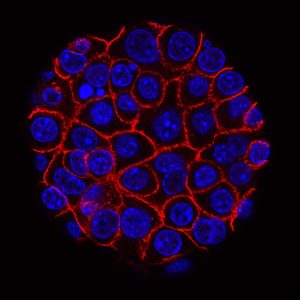
AstraZeneca & MSD ovarian cancer drug combination approved by NICE
pharmafile | March 19, 2021 | News story | Medical Communications | AstraZeneca, MSD, NICE, oncology
A new precision drug combination, olaparib with bevacizumab, will now be available on the Cancer Drugs Fund (CDF) for ovarian cancer treatment following its approval by NICE, AstraZeneca and MSD announced today.
The two drugs can now be used as a maintenance treatment for patients with advanced ovarian, fallopian tube, and peritoneal cancer, after complete or partial response to first-line platinum-based chemotherapy and bevacizumab, who have tested positive for homologous recombination deficiency (HRD).
Data from the Phase III PAOLA-1 trial show that the new treatment combination can reduce the risk of disease progression or death in these patients by 67% versus treatment with bevacizumab alone.
Dr Susana Banerjee, Consultant Medical Oncologist at The Royal Marsden and Team Leader in Gynaecological Cancers at The Institute of Cancer Research, said: “Olaparib is a British-led medical innovation that has spearheaded the introduction of personalised treatment of advanced ovarian cancer in the UK and around the world.”
“Today’s announcement is another important milestone for women with newly diagnosed ovarian cancer in England who can now, for the first time, access combination targeted treatment – olaparib with bevacizumab”.
Currently, the ovarian cancer treatment pathway in England means that people without a mutation in the breast cancer genes have to wait until the cancer has come back, when the prognosis is worse, to gain access to a PARP inhibitor. This new recommendation means that patients with HRD would be eligible for the treatment, regardless of BRCA status. Around 1,100 women will now qualify for this treatment in England.
Women with newly diagnosed advanced ovarian cancer are the only patients in whom treatment has curative potential; however, with current standard treatment with chemotherapy, around 70% of patients relapse.
David Long, UK Oncology Business Unit Director at MSD, said: “Ovarian cancer has the worst prognosis and highest death rate among all gynaecological cancers, and advances in treatment are key to changing this story. From today, more women will have the chance to benefit from this personalised treatment regimen that could change the course of their disease, with data showing that disease progression could be stalled for more than three years. It’s now crucial that every woman in England who could possibly benefit from this treatment combination is offered an HRD test.”
One in two (48%) women with newly-diagnosed advanced ovarian cancer have HRD positive tumours and now, for the first time in England, an HRD test is available to support personalisation of their treatment through the NHS.
Arun Krishna, Head of Oncology at AstraZeneca UK, said: “We have come a long way in treating ovarian cancer with genomic profiling enabling the identification of subtypes of disease, which we can then target with appropriate treatment. Our focus now is on working closely with external partners and the Genomic Laboratory Hubs to introduce and fund the first-ever HRD testing service in England.”
Kat Jenkins
Related Content

NICE recommends migraine treatment for NHS use
The National Institute for Health and Care Excellence (NICE) has shared draft guidance recommending AbbVie’s …

AstraZeneca shares results for Imfinzi in phase 3 trial for small cell lung cancer
AstraZeneca has announced positive high-level results from the phase 3 ADRIATIC trial, which demonstrated that …

FDA accepts BLA for AstraZeneca and Daiichi Sankyo’s datopotamab deruxtecan for breast cancer treatment
AstraZeneca and Daiichi Sankyo have announced that their Biologics License Application (BLA) for datopotamab deruxtecan …








